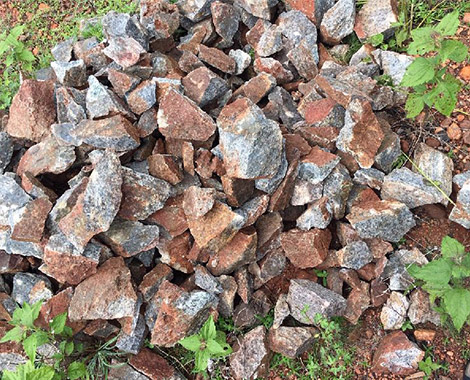KAYNITE
Kyanite is a typically blue silicate mineral, commonly found in aluminium rich metamorphic or sedimentary Rocks.Kyanite is a member of the alumino-silicate series, which includes the polymorphs, alusite and sillimanite, which have the same chemical composition (Al2O3.SiO2) as alusite and sillimanite but it is distinguished from those two minerals by its physical properties


Refractory Materials :
Refractories are heat-resistant materials that constitute the linings for high-temperature furnaces and reactors and must be able to withstand high temperatures, mechanical wear, thermal shock and chemical corrosion. Kyanite is used in refractories sometimes in raw form and mostly in calcined form.
1. Raw kyanite: Kyanite has high expansion coefficient. Moreover, its calcination into mullite is also accompanied by a significant expansion in volume (20%). Raw kyanite as a refractory material is thus particularly beneficial when shrinkage from other materials and binders needs to be compensated for.
2. Calcined kyanite: Kyanite calcined to mullite is widely utilized in refractory products. Mullite exhibits excellent refractory properties like thermal stability (it is stable upto 1810ºC), thermal shock resistance, creep resistance, and high hot strength and chemical corrosion resistance.
Refractory bricks made from calcined kyanite possess outstanding:- Higher modulus of rupture.
- Lower co-efficient of expansion.
- Increased firing range and temperature.
- Increased durability, about three times that of ordinary bricks.
- More resistance to salt attacks.
- Very low co-efficient of spalling.
Kyanite refractories find application used in glass industry as well as various metallurigical industries (except steel metallurgy, as mullite refractory bricks are corroded by iron slag and are not highly resistant to metallic oxides).
Kyanite has been a supplier of raw kyanite for many years. Our kyanite is high in purity, free from iron oxide, silica, bases and alkalis. These impurities considerably reduce the softening point of mullite and thus affect the refractory properties. Indian kyanite is often associated with the mineral corundum. This is advantageous as it reduces the percentage of free silica when calcined. All in all.
Specfications :
Al203:- 35-52%
Fe2o3:- 1-5%

